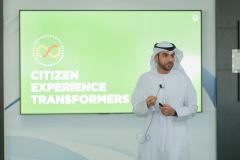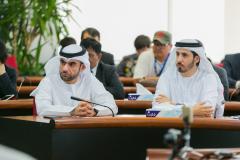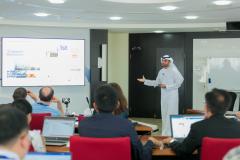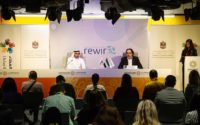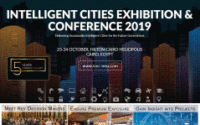MBRSG To Host 20th Annual International Conference On Digital Government Research For The First Time In The Middle East
The Mohammed bin Rashid School of Government (MBRSG) – the first research and teaching institution focused on promoting governance and public policy in the Arab world hosted the 20th Annual International Conference on Digital Government Research (dg.o 2019), for the first time in the Middle East, in Dubai on June 19-20, 2019.
The launch event was attended by MBRSG’s Executive President His Excellency Dr Ali Sebaa Al Marri; Younus Al Nasser, Assistant Director General of Smart Dubai and Chief Executive Officer of Dubai Data Establishment; Fadi Salem, the Conference Co-Chair and MBRSG’s Director of Research and Advisory, with a group of experts and academic researchers in the field of digital governance and pioneers in government work from around the world.
The conference discussed scientific papers, research and studies on digital governance and the transformation of government in the age of Artificial Intelligence. The experts also discussed the application of digital technologies in development plans, government services and smart cities. Other topics of deliberation included the participation of civil society and the role of government innovation in the age of Artificial Intelligence.
“Led by the vision and guidance of the UAE’s leadership, our nation has hosted several international meetings and conferences, including in digital governance. The UAE is an incubator of powerful ideas and the facilitatory environment has made the nation a global centre for innovation, especially in the fields of public administration and public policies. As an academic research institution specialised in government administration and public policies, MBRSG is committed to supporting the UAE’s march and accelerating growth to be future-ready,” said HE Al Marri.
“Through this pathbreaking event, we aim to strengthen the role of Dubai and the UAE as a global hub for future governments, a laboratory for government policy-makers and leaders to develop government services and create new opportunities to improve the quality of life of the people,” he added.
HE Al Marri explained: “The UAE has established itself as a leading model for future governments. We look forward to sharing our expertise and the use of the latest research and studies to develop governments, and to develop the best tools that drive the digital transformation of the governments of the world.”
H.E. Younus Al Nasser, Assistant Director General of Smart Dubai and CEO of Smart Dubai Data said: “Smart Dubai is committed to pursuing the adoption and use of advanced technologies to support Dubai’s transformation into the smartest and happiest city in the world. The transformation of digital governments has gained considerable international attention, with global events such as the Annual International Conference on Digital Government Research offering new opportunities for specialists and decision-makers on the applications and services of future smart cities. It also underlined the best ways to speed up digital transformation. The conference provided an opportunity for all stakeholders to sharea best practices and develop advanced solutions to address the challenges facing the Smart Cities sector around the world.”
This year’s session of the conference included several path-breaking research papers on the application of Artificial Intelligence that present many challenges and opportunities for governments around the world to develop innovative policies, shape new tools to deliver services and create new economic opportunities through the application of algorithms and the study of the societal impacts of large data, as well as the effect of Block Chain technology, the Internet of Things and Smart City applications.
“Hosting of this well-established international conference is an important addition in the course of the Mohammed bin Rashid School of Government’s research efforts. It reiterates our focus on excellence and our role as an internationally recognised institute in digital government and policy research. The level of research papers, studies and content presented at the conference has been impressive. The topics covered included the latest developments in digital governance, artificial intelligence, public policies, transformation of smart cities and the implications of big data and the Fourth Industrial Revolution on the future of governments,” said Fadi Salem.
“We aim to expand our academic credentials and participate actively in pioneering research projects and improve the quality of government work around the world. Scientific and policy research play a critical role in supporting the development of the government of the future in the UAE and the Arab region,” he added.
“Change should be an approach to the development of management research and government policies,” said Dr. Marin Janssen, co-chair of the conference, ICT and governance professor and head of ICT at the School of Technology, Policy and Management at Delft University of Technology in the Netherlands. “The research findings presented at the conference reflect the process of positive change, and present a vision for the future of governments over the next ten years.”
Jansen thanked the Mohammed bin Rashid School of Government for hosting the conference led by it distinguished academic position and stressed that Dubai is a pioneer in adopting the latest technologies and innovations that contribute to the development of government mechanisms, making it a model for future governments and the governments of the world.
Yu-Che Chen, Co-Chair of the Conference Program, Professor of Digital Governance and Director of the Global Digital Governance Laboratory at the College of Public affairs and Community Service at Nebraska Omaha University, expressed his delight in being in Dubai. He said Dubai has witnessed remarkable development in all fields, which qualifies the city to lead government transformation in the UAE and the region. “The conference represents a great opportunity to meet with a group of the best researchers, academics and experts from all over the world. We have a good range of research and studies that will revolutionise intelligent transformation and the application of Artificial Intelligence techniques in many government practices.
Over 200 experts in digital government from 62 cities in 45 countries attended the event. The conference accepted 150 research papers in advance such as in the field of Artificial Intelligence, digital governance and public policy. These were presented in 6 workshops, 3 seminars, 14 doctoral sessions and 21 sessions over the course of three days.
